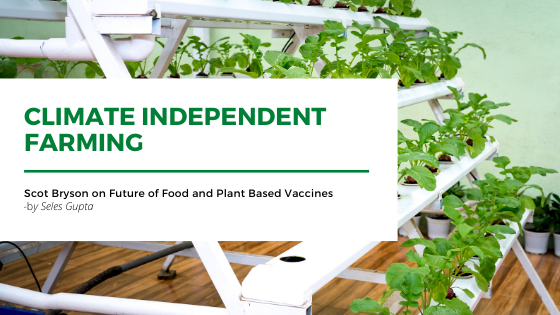Building Sustainable Food Systems and Developing Plant-Based Vaccines: An Interview with Scot Bryson, CEO of Orbital Farms
To make food production more sustainable, a circular project development company, Orbital Farms, is working to create a system by integrating biotech, energy and aquaponics. This is how they do it.
As the coronavirus has enveloped the entire global population in its chaos and our whole nation has gone into lockdown, I, like many of my friends, have turned to the internet to engage my mind by reading all sorts of innovation stories published on various outlets. And this is how I came across this Forbes article.
Published in March 2020, this article talked about how different food and biotech companies, across the globe, are working to develop climate independent, farm-free food systems that are sustainable and relatively environment- friendly. In it, they mentioned about a circular project development company -Orbital Farms- and how is it working to integrate different technologies. With the integration of Agritech, Biotech and other technologies, they'll be able to produce all types of food-crops, seafood, vegan proteins, nutrients- anywhere on this planet, irrespective of the climatic conditions.[In my last blog post, I wrote in detail about how vegan proteins can be made, using just water and air, and how they can be incorporated in different food items. You can read it here]
Intrigued and inspired, after reading this article, I dived into the depths of the internet and tried to find as much information as I possibly could to know more about this new food system. But all of the information and articles still couldn't satisfy my curious cerebral cells. So I decided to take matters into my own hands.This week I called Scot Bryson, CEO and Founder of Orbital Farms, to hear more about the work he is doing and to learn about the new food production system his company is working on, that has the potential to completely revolutionize the global food industry. Apart from this, they are also working to develop plant-based vaccines and medicines.
Hello Scot, to start with... Orbital Farms is
working to develop climate independent growing systems. How would you explain
this process, of ‘growing fruits and vegetables through climate independent systems’ in simpler terms for the readers?
We, at Orbital Farms, use a system called Aquaponics- a system where fish
and plants grow in a symbiotic relationship. This has been around for
a very long time. The Mayans used this system to grow corn. They had fields where they were
planting their corn and they would use the water from the nearby water source to irrigate their fields. They had figured out that if they just raised
fish in their water source (river) and then used that nutrient-rich water to irrigate their fields, the quantity of their produce would increase and their plants would grow faster in comparison to
when they didn’t raise fish. And so, they adopted this symbiotic farming system.
In this aquaponics system, the fish raised in the water
releases ammonia as a waste product. And then a type of bacteria in the water converts
ammonia into nitrates and the second type of bacteria converts the nitrates into nitrites. These can then be used as nutrients for plants. This system of aquaponics can be used to grow any type of plant.
We at Orbital Farm have an aquaculture system and a greenhouse system. And by
controlling climatic conditions such as pH, temperature, etc, we can grow any
plant in a completely closed, contained system.
Why is it important for
people to know about the work you are doing and Why should readers
care about it?
It’s difficult being a farmer nowadays. We have
built our agriculture system on predictable weather and climatic conditions. But
now, the climate is dramatically changing and due to this, farmers are
struggling; they are suffering huge losses and are not even being able to plant
according to their plans because of this unpredictable climate. This
unpredictability is going to have a dramatic effect on our
food system and our ability to produce food. We must build systems that are
independent of the climate. We must build the ability for us to produce food in
very dramatically different ways. Otherwise, we are not going to have enough
food.
Another example of a situation arising from climate
change…right now, in east Africa, conditions and climate are perfect for locusts to grow. These
locusts are growing faster than before. There are predictions that this swarm
will become large enough to travel across Africa and consume about 80% of the crops. This
is not a doom and gloom scenario. We need to be prepared and have systems to
feed millions of people in situations of massive devastation. We need to be prepared for situations or years
when we are not able to produce enough food due to external circumstances that
affect people around the globe.
We are seeing now how due to coronavirus, the global
economy has shut down. This showcases the fragility of our interconnected
systems. The food insecurity that is arising from this situation is traumatic.
There were over 820 million people that went hungry in 2019. I’m very scared
about what that number is going to look like coming out of 2020. The food
insecurity around the world, people’s ability to pay for food is going to take
a massive hit. We need to move as
quickly as we possibly can to develop a different way to produce food- that is
clean, safe and climate independent.
What
challenges have you had along the way?
When you
are trying to do something new, everything is a challenge. Getting large
companies and organizations on board is challenging.
There’s
not a person that I have come across or talked to that has said to me ‘that’s a
stupid idea, it is not going to work’. Every single person has said ‘this is
amazing, how can I help, what can I do’. But when the time comes for companies
to put their resources behind it, or for investors to pay money upfront, it is
challenging because most of them, say ‘build the first large facility, and when
once you have that running, that’s where we can really pitch in’.
Are
you collaborating with any other research institutions/ organisations?
I have
been in conversations with some local organizations, NGOs and organizations from
the aerospace sector. I’m looking at writing a paper together with Oxford
University. We are also looking forward to writing a paper together with CIGI (Centre
for International Governance Innovation)- to develop a legal framework around
this project.
What is the current status of your project and
what will you do next?
We are currently trying to develop our first project sites. We are in
discussion on licensing some additional technologies that would enable us to
produce vaccines within our facility.
As I mentioned earlier, we can grow any
type of plant at our site. We can also grow plants to make vaccines. So, currently, we
are working on plant-based vaccines and medicines. They need a specific type of greenhouses that aren’t
exposed to external elements because if you are going to develop a vaccine, you
don’t want a runoff from a neighbouring farm that was putting too much
fertilizer on their soil, that is now running off into these plants. You don’t want that
landing on the leaves of your plants and then using, concentrating and
injecting it into somebody’s bloodstream. So you need to have a closed system to
grow these vaccines. And that’s what Orbital Farms is doing. This is what we
are focusing on now. We are using our greenhouses to produce vaccines for
corona-virus. And these vaccines are currently in pre-clinical trials.
This interview has been edited and condensed for clarity.




Nyc
ReplyDelete